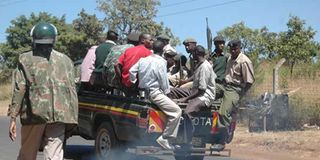Now prison warders join police in street patrols in Nairobi

Prison warders on patrol. Now hundreds of warders have been deployed in the streets of Nairobi for patrols alongside their regular police counterparts to boost security. FILE PHOTO | NATION MEDIA GROUP
What you need to know:
- The warders are working “hand in hand” with the regular police to boost security, according to Nairobi deputy police boss Moses Ombati.
- Their core mandate is to guard prisoners but their current redeployment is in line with an executive order made by President Uhuru Kenyatta in June 2014.
- In the order, the Head of State placed all disciplined forces personnel, except the military, under the Inspector-General of Police.
- The law authorises the police boss to gazette special police officers to help in law enforcement in such circumstances.
Hundreds of prison warders have been deployed in the streets of Nairobi for patrols alongside their regular police counterparts.
The warders are working “hand in hand” with the regular police to boost security, according to Nairobi deputy police boss Moses Ombati.
“Their deployment is helping increase security officers’ presence in the streets.
"We are not taking any chances and we can say we have enough numbers. In case anything happens, we have enough personnel to respond,” Mr Ombati said.
The warders’ core mandate is to guard prisoners but their current redeployment is in line with an executive order made by President Uhuru Kenyatta in June 2014.
PLACED UNDER POLICE IG
In the order, the Head of State placed all disciplined forces personnel, except the military, under the Inspector-General of Police.
It effectively put the IG in charge of more than 105,000 armed security personnel, who include the Kenya Wildlife Service, the Kenya Forestry Service and the Prisons Department.
Under this expansive responsibility, the police boss was also given the control of government equipment owned by those agencies for use at any time, to enhance security.
But the executive order did not take away the powers of government agencies owning various equipment but brought government resources under one command for ease of operations.
Outgoing IG David Kimaiyo has since June invoked the powers several times, including to use Kenya Wildlife Service (KWS) helicopters to access bandit-prone areas where violence had occurred.
Conventionally, the blanket use of security personnel from other agencies by the police boss occurs when there’s a general election.
SPECIAL POLICE OFFICERS
The law authorises the police boss to gazette special police officers to help in law enforcement in such circumstances.
But the powers have never before been used to deploy non-regular officers for normal street patrols.
The executive order largely boosted the Kenya Police Airwing, which operates a skeleton fleet with only two serviceable aircraft.
Now, police are in control of about 10 aircraft owned by the KWS, the Kenya Forest Services as well as the Kenya Pipeline Corporation.
The police have 13 aircraft in their inventory, but two of them crashed and could not be repaired, while six are classified as beyond economic repair — meaning they are repairable but the estimated repair cost far exceeds the value of replacing them.
Two have been listed for overhaul.
The two NS17 models made in Russia have been tendered for procedural overhaul.





